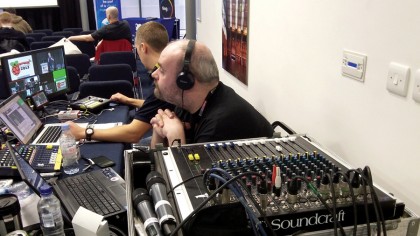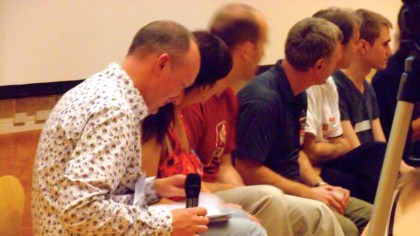Raspberry Jams: why Raspberry Pi is going back to school
A recipe for success
Sign up for breaking news, reviews, opinion, top tech deals, and more.
You are now subscribed
Your newsletter sign-up was successful
At the big Anniversary Jam, I ran a track of talks and demos upstairs throughout both days, so we had Scratch and Python workshops, robotics sessions, camera module demos, and short talks about Raspbian, weather stations and an intro to Linux.
JW: We hire out two rooms; one is a hardware hack space and another is a talk space; after the introductory talk, attendees can either start hacking or give or watch talks or demos of their Raspberry Pi projects.
MH: The last Jam was split into four parts. There were two sessions of formal presentations and demos and then two 'show-and-tell' sessions where the attendees could mingle and see other projects that had been brought along.

LXF: What projects have you or your Jam undertaken?
BN: Initially I used my Pi as a media centre and a tool for teaching Python, but more recently I've built a weather station for the BBC, I've been playing with the camera module for time-lapse photography, I've set up websites and used it to teach kids at MadLabU18's CoderDojo about how web servers work. We use one as a file server and shared database server at work.
One of my upcoming projects will be setting one up as an offline Bitcoin wallet! I'd also like to do more with GPIO in future.
JW: We had a particularly interesting talk given by a professor from the Computer Science department about porting an Artificial Intelligence engine to the Pi, along with a few examples of how AI software works - and doesn't work! - on different platforms.
Sign up for breaking news, reviews, opinion, top tech deals, and more.
MH: My first project was an attempt to create a 'tricorder' (a Star Trek device). Essentially, it's a bunch of sensors read by the Pi and an Arduino and displayed on a two-line LCD display. The second version is in development and does away with the Arduino to make a pure Picorder.
The second project is a pan-and-tilt mechanism for the official camera board that can be controlled via a web browser interface.
LXF: What would you like to do at a future Jam?
BN: More of the same! I love being at a Jam. There's a great atmosphere, you see people having so much fun, regardless of age and experience. In the early days it was difficult to organise talks as everyone was new to it, but now there are so many projects, there's more to share. The talks worked well at the Anniversary Jam so I think I'll do something similar in future, perhaps alternating between only having talks and just hacking time.
JW: At the next event we're hoping to help with the creation of resources for schools. Hopefully we'll be able to put together some useful material, which can make it easier for teachers to harness the power of the Pi in their classroom
MH: I'd eventually like to run a large-scale Jam in Cambridge similar to the recent Manchester Jamboree, which could feature hands-on workshop sessions and appeal to young programmers who want to work on projects 'on the day'.
The future of Raspberry Jams

It is clear, that the Raspberry Jams are here to stay, much in the same way that we have Linux user groups around the world. The open, social nature of these groups makes for a great learning environment, and the wealth of experience on hand is amazing.
After the success of the 2013 Jamboree (which can be considered the ultimate Raspberry Jam) there's talk of a second, larger Jamboree in 2014. The 2013 event attracted 400 people, with lots of teachers swapping knowledge and building lesson plans around the Raspberry Pi.
If you have one near to you, drop in on it and see for yourself. Find your local Jam on http://raspberryjam.org. If there isn't a Jam near to you, then why not have a go at starting your own.